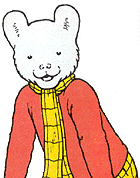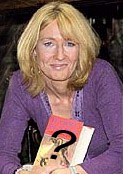|
Contents:
|
|
 Peter Rabbit celebrates his 100th birthday in October
this year (again! - and why not?).
Peter Rabbit celebrates his 100th birthday in October
this year (again! - and why not?).
First
created in a letter from Beatrix Potter to young boy in 1893, (anniversary
commemorated by Beswick with a porcelain figure in 1993), Peter Rabbit was
later developed into the story now known and loved the world over.
 At the
time, however, the author was rejected by no less than 6 publishers and had
the story privately printed in 1901. It was not until 1902 that Frederick
Warne agreed to publish the tale and that is the anniversary that is commemorated
this year.
At the
time, however, the author was rejected by no less than 6 publishers and had
the story privately printed in 1901. It was not until 1902 that Frederick
Warne agreed to publish the tale and that is the anniversary that is commemorated
this year.
Celebrate Peter Rabbit's centenary by visiting Hill Top Farm in Near
Sawrey where Beatrix Potter lived, worked and gained inspiration for
her beautiful illustrations in the tales. |
 Meet John Harrold, the official Rupert Bear
illustrator for the Daily Express annuals, when he signs copies of this
year's Rupert Annual during Canterbury's 2002 Rupert Bear Day, Saturday 9th
November 10am-4pm, Canterbury Environment Centre, St. Alphege Lane,
Canterbury.
Meet John Harrold, the official Rupert Bear
illustrator for the Daily Express annuals, when he signs copies of this
year's Rupert Annual during Canterbury's 2002 Rupert Bear Day, Saturday 9th
November 10am-4pm, Canterbury Environment Centre, St. Alphege Lane,
Canterbury.
Plus
sale of Rupert books, artwork and memorabilia by the country's leading Rupert
booksellers. Organised by the Followers of Rupert and sponsored by Stella
Books and Canterbury City Council. |
|
The PBFA are holding their annual
specialist Childrens and Illustrated Book Fair on Saturday 26th October.
The venue in the Crown Hotel in Harrogate. Open 10.30am - 5.30pm.
Stella Books will be exhibiting. |
|
from Philip Lund
English
as She is Wrote |
|
Instead of an article on the authors or contents
of books this month, here is a small contribution on how we put our language
and thoughts into print on the page. |
|
Browsing,
as one does, in my Oxford Companion to the English Language one day a few
months ago, I came across the entry on spelling reform. It was quite an eye
opener. It appears that over the centuries Italian, French, Spanish, Russian,
German, Dutch and many other languages have all had their spelling systems
reformed either by language academies, government departments or international
conferences. Only English has remained virtually untouched (apart from some
minor adjustments in America) since Dr Johnson's dictionary. |
|
And given that written English combines the spelling
systems of Norman French and Old English and has a substantial body of words
imported wholesale from Scandinavian, Latin, Greek and then everywhere else
in the world, it makes for one of the most difficult and complicated orthographic
systems of any language presently used. Which is ironic, considering it is
one of the most widely used languages in the world, both as a first, and
a vital second, language. |
|
Now
I don't myself have many problems with the spelling of English. As a child
I waltzed through spelling tests. But many people do. One of the reasons
English is the prime international language is the simplicity of its grammar.
But the difficulties of its spelling impede the literacy of English speakers
worldwide, and set up a real barrier to non-native learners of the language.
|
|
Many people have made suggestions as to how we could
reform. In 1908 the Simplified Spelling Society (SSS) was formed. Over the
years its members (who have included such luminaries as H G Wells and Archbishop
William Temple) have campaigned to 'bring about a reform of the spelling
of English in the interests of ease of learning and economy of writing'.
All to no avail, so far. Systems which demanded new letters of the alphabet,
or radical changes which are confusing to look at and feel silly or childish
(e.g. The bote is cumming into the shaw.) have been recognised as non-starters.
|
|
Since
the early 1990s the SSS has taken up the idea of the Australian psychologist,
Valerie Yule, of Cut Spelling as the way forward. The idea of Cut Spelling
is that very little is changed to the eye, but in practice texts are shorter,
more consistent, and easier to learn. There are three rules (which are applied
sensibly, not rigorously). |
|
Rule 1. Letrs ar cut from words where they hav nothing
to do with how words sound. Many ar obvius, like the B in debt or the G in
foreign. |
|
Rule
2 cuts unstressed vowel letters, usually in the last sylabls of words - e.g.
chapel - chapl, curtain - curtn, washed - washd. |
|
Rule 3 cuts dubld consonants. Accommodate becomes acomodate
(but note that holly stays as it is, to avoid confusion) |
|
There
are also three substitution rules - use F instead of GH or PH (e.g. cof for
cough and fotograf); use J instead of DG or G where they are pronounced as
j. (e.g. juj, brij); Y is substituted for IG in words like sigh and sign
and right (sy, syn, ryt) and for IE in words like replied (replyd). |
|
Its al quite simpl, not to controversial, and wud make
life a lot simplr for milions of peple. And those of us ho hav grown up speling
the oldfashnd way would stil be able to read the new texts without much trubl
even if we kept on using the old spelings ourselvs. |
|
The
Simplified Spelling Society can be found at
http://www.spellingsociety.org/index.html |
|
|
 J. K. Rowling's fifth book in the
Harry Potter saga, promised for a while now, is hoped to be available in
time for Christmas 2002. The book has a title, 'The Order of the Phoenix',
and the beginning, middle and ending are established but she describes herself
as a perfectionist and wants a bit more time to 'tweak it'.
J. K. Rowling's fifth book in the
Harry Potter saga, promised for a while now, is hoped to be available in
time for Christmas 2002. The book has a title, 'The Order of the Phoenix',
and the beginning, middle and ending are established but she describes herself
as a perfectionist and wants a bit more time to 'tweak it'.
Note:
A survey conducted by the educational booksellers 'Kumon' has revealed that
'Harry Potter and the Philosphers Stone' is the most popular children's book
'of all time'. There's no doubt that it's very good but it does make you
wonder what their definition of the span 'of all time' was? |
|
The six shortlisted novelists for
the 2002 Man Booker Prize have been announced. They are Yann Martel
with "Life of Pi", Rohinton Mistry with "Family Matters", Carol Shields with
"Unless", William Trevor with "The Story Of Lucy Gault", Sarah Waters with
"Fingersmith" and Tim Winton with "Dirt Music". |
|
Next Month:
In
November 2002 the featured article will be a surprise! |
|

